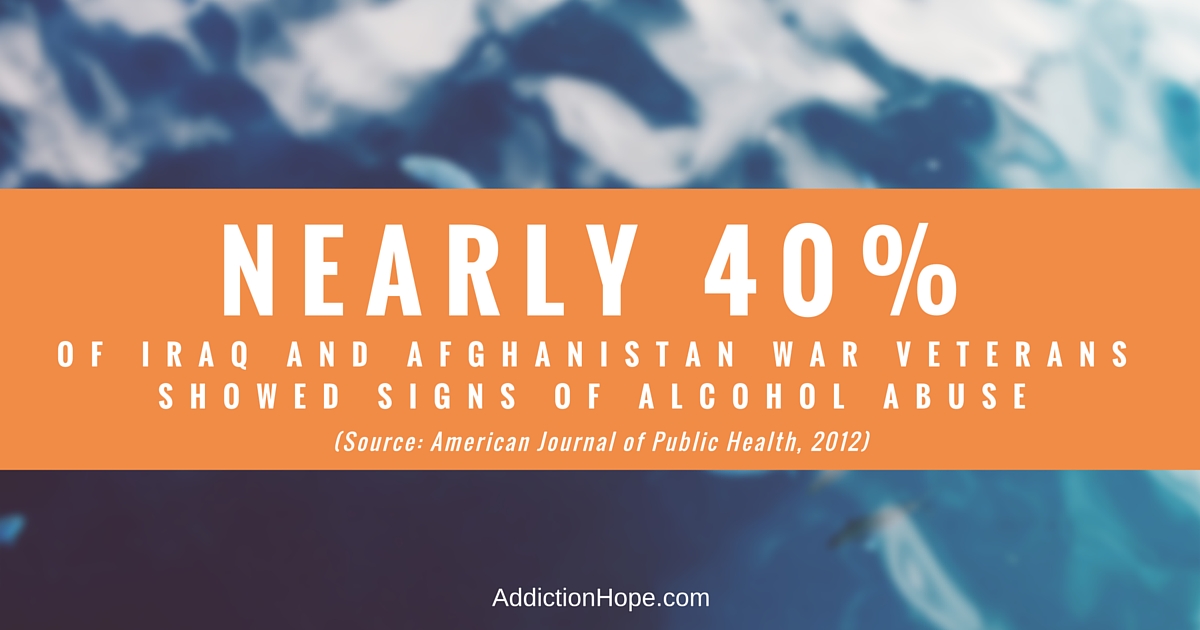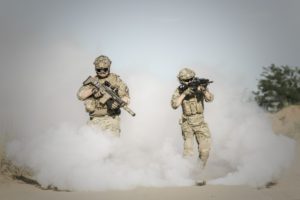
Contributed by Staff of Timberline Knolls
The men and women who serve in the United States military are among the most selfless and brave individuals in our society. However, they need substance abuse resources, too. Despite such exceptional qualities within our soldiers, this does not exempt the military personnel from the struggles associated with substance abuse and addiction.
The U.S. Department of Veteran Affairs reported that 1 in 10 veterans from the wars in Iraq and Afghanistan have experienced problems with drugs or alcohol. The department also showed that 1 in 3 veterans seeking treatment for a substance use disorder also battled with post-traumatic stress disorder (PTSD).
The reality is that substance abuse results from the combination of numerous complex factors that are often out of a person’s control, such as their genetic makeup and neurobiology. Other contributing components include environmental circumstances, such as exposure to drugs at an early age, the experience of traumatic or stressful situations amongst others. In case of military personnel, exposure to combat and extremely strict training schedules can have the same effect.
Military Members and Substance Abuse
The conditions endured by military personnel in our country today may be particularly triggering for an individual who is already biologically predisposed to developing addictive behaviors. The stressors that servicemen and women in uniform endure include:
- Separation from family members and loved ones
- Exposure to war, trauma and death
- Intense physical, emotional and psychological demands
These elements in combination with the unique culture of the military, may particularly expose service members with a predisposition to substance abuse and addiction.
Substance abuse among military members ranges from illicit drugs to prescription medication, cigarette use and alcohol.

According to the National Institute on Drug Abuse, the most common substances abused among service members include prescription medications, especially opioids, and alcohol and cigarettes, with incidences of abuse being higher among military servicemen and women than compared to civilians.
Substance Abuse Resources Available For Military Members
For any military member who might be dealing with substance abuse, this issue can quickly escalate to becoming disruptive with their health, work, personal life, relationships, finances and more.
Many military members who might be struggling with substance abuse may postpone seeking professional help due to:
- The stigmas associated with addiction,
- Avoidance of potential disciplinary actions, or even
- Fear of losing their job.
While several branches of the military have actively taken steps toward the prevention, identification and treatment of substance abuse among soldiers, connecting to appropriate resources while in the military can feel difficult.
Accessibility to help
 Every military branch has available resources for connecting service members with appropriate treatment interventions for substance abuse as needed. Typically, a military health care professional can provide a referral for an assessment when substance abuse is suspected.
Every military branch has available resources for connecting service members with appropriate treatment interventions for substance abuse as needed. Typically, a military health care professional can provide a referral for an assessment when substance abuse is suspected.
A professional assessment can help determine the appropriate level of care and addiction treatment that might be needed for a service member, and it can evaluate the severity of one’s substance abuse disorder. Recommendations for treatment can then be provided, particularly if treatment can be adequately administered in military facilities.
Examples of Military Substance Abuse Resources
Each service branch of the military offers counseling services in addition to substance abuse prevention and treatment programs. These include, but are not limited to, the following:
- Navy Alcohol and Drug Abuse Prevention: their mission is to facilitate the readiness of the fleet by fighting alcohol and drug abuse, catering to the unique needs of their personnel in context of their work
- Army Substance Abuse Program: this program aims to improve the overall fitness and efficacy of the Army workforce through the provision of quality all-encompassing services
- Marine Corps Substance Abuse Program: The Substance Abuse Program utilizes evidence-based programming and practices, including prevention education, early intervention initiatives, counseling, and drug and alcohol deterrent activities in order to promote overall health and mission readiness.
- Air Force Alcohol and Drug Abuse Prevention and Treatment (ADAPT) Program: In case prevention has failed, the Air Force assumes responsibility for the identification and treatment of drug abusers alongside comprehensive education regarding substance misuse.
- Transition Assistance Program (TAP): Veterans Affairs provides comprehensive support through TAP to help individuals transition to civilian life after the military.
What can be done?
It’s important for everyone on active duty to take preventative health measures, but particularly those who will soon be deployed. Exercising positive health habit prior to deployment can help make this transition easier. This includes practices like:
- Development of healthy sleep habits
- Understanding the Deployment Health Assessment Program to maximize resilience
- Connecting with friends and family to maintain a grounded and healthy support system during deployment
- Avoiding substances of abuse
- Maintaining a fitness routine and a nourishing diet
- Settling down financial matters before leaving
Military members often endure the most excruciating circumstances in the name of freedom, and many may suffer in silence when battling substance abuse disorder. There is no shame and weakness in reaching out for help when needed. Connecting to the treatment and prevention programs offered through each respective military branch can help promote the service member’s journey towards healing, recovery and ultimate freedom.
References
[1] National Institute on Drug Abuse, “DrugFacts: Substance Abuse in the Military”, Accessed 30 May 2016: https://www.drugabuse.gov/publications/drugfacts/substance-abuse-in-military
[2] https://www.therecoveryvillage.com/resources/military-resources/
[3] https://www.benefits.va.gov/tap/tap-index.asp
[4] https://www.drugabuse.gov/publications/drugfacts/substance-abuse-in-military
Thank you to Timberline Knolls for providing this article.
Timberline Knolls is a leading residential treatment center for women and adolescent girls, ages 12 and older, with eating disorders, substance abuse, trauma, mood and co-occurring disorders. Located in suburban Chicago, residents receive excellent clinical care from a highly trained professional staff on a picturesque 43-acre wooded campus. An adult partial hospitalization program (PHP) is also available in nearby Orland Park, Ill., for women to step down or direct admit. For more information on Timberline Knolls Residential Treatment Center, call 630-755-5173. We are also on Facebook – Timberline Knolls, LinkedIn – Timberline Knolls and Twitter – @TimberlineToday.
The opinions and views of our guest contributors are shared to provide a broad perspective of addictions. These are not necessarily the views of Addiction Hope, but an effort to offer a discussion of various issues by different concerned individuals.
We at Addiction Hope understand that addictions result from multiple physical, emotional, environmental, and genetic factors. If you or a loved one are suffering from an addiction, please know that there is hope for you, and seek immediate professional help.
Published on July 16, 2019
Reviewed and Updated by Jacquelyn Ekern, MS, LPC on January 12, 2021
Published on AddictionHope.com
